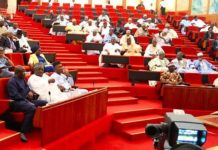Even after six months of President Bola Tinubu’s government, the cost of living has increased at an exponential rate.
According to reports, the majority of Nigerians are now living in even greater hardship as a result of President Tinubu’s elimination of subsidies.
The World Bank estimates that in 2023, 104 million Nigerians lived in poverty, or a 46 percent rise from the previous year.
Household spending was significantly impacted by inflation, which increased to 27.33% in October 2023 and 28.20% in November, according to the National Bureau of Statistics (NBS).
According to the NBS, price rises for milk, cheese, eggs, fish, vegetables, yam and other tubers, bread and cereals, oil and fat, fruits, and meat were the main reasons behind the rise in food inflation year over year.
A review of food costs in Nigeria in January revealed that the price of a 50kg bag of rice ranges from N45,000 to N60,000.
A 50 kilogram bag of beans costs between N60,000 and N70,000, whilst a tuber of yam costs between N800 and N3000.
Prices for noodles vary by type and size; some brands might cost anywhere from N7000 to N9000.
Nigerians love garri, a famous staple produced from cassava that ranges in price from N30,000 to N40,000 for a 50kg bag, depending on the brand and quality.
Potatoes weigh 25 kg, and a bag costs between N6,000 and N9,000. 12 boxes of spaghetti can cost up to N13,000, depending on the brand.
While the price of a 5-liter bottle of palm oil is between N6,500 and N7,500, that of a 5-liter bottle of vegetable oil is from N7,500 to N9,500.
Nigerians are starting to express major concerns about these outrageous price increases for staple commodities.
Though many Nigerians still believe it is taking longer than anticipated for things to change, the President and his staff have been steadfast in assuring the populace of their ability to fix the nation.
“The Tinubu government need to feel sorry for Nigerians and implement measures that will somewhat ease the lives of the general populace.
The price of gas is having an impact on people’s ability to subsist. People often steal or find other ways to survive when they are hungry.
Ekong Eduok stated at Utako Market, “The President should also consider a review of the minimum wage for civil servants.”
Chibuzo Nwoke, the owner of a bookshop in the same market, stated independently, “I think things will only get worse as long as there is insecurity.”
“The President ought to concentrate on finding a solution to the nationwide insecurity issue, in my opinion. Farmers ought to feel safe returning to their farms.
Therefore, it is necessary to curtail the issue of occasional killings. The topic of moving food from the farm to the market will then come up.
Mr. Abdul Sani also spoke, stating, “We are tired.” The president needs to go to work, and the only way the public will know that this government is doing its job is if the market starts to cooperate. I wonder how the underprivileged are eating right now.
“I don’t believe there is any chance. Food and other household item prices are skyrocketing in tandem with the dollar’s continuous climb.
“Is this not the same money that they are stealing? He mentioned giving money to the most impoverished members of society. Every now and then, corruption occurs. I believe that until God decides to step in, nothing positive will come from this regime.
A subject-matter expert in economics and the Chief Executive Director of the Economic Associates stated that the government needs to exert all of its efforts to stabilize the foreign currency market.
As long as the currency rate remained unstable, Teriba maintained, there would be no economic growth and competition.
One significant expense that still has to be addressed is the rising volatility of exchange rates, particularly in the official market.
Today’s exchange rate may be N1000 to $1, but it might also drop to N800 or N850 to $1.
“Business decisions are discouraged by that degree of instability. Investment outlays are probably going to be postponed. Moreover, the dollar rate’s volatility has repercussions.
The effect is transferred to local consumer prices. An increase in food and energy price shocks that lower consumer living standards and undermine corporate viability is caused by exchange rate volatility.
Therefore, it is not unexpected that some companies choosing to close their doors after operating in Nigeria for a considerable amount of time.
“How soon are we putting an end to that volatility?” is the important question for the forecast in 2024. Growth is not possible with such unpredictability.
With such instability, inflation won’t decrease. Therefore, you must stabilize the foreign currency market before you can begin to speak seriously about growth,” he said.
The budget for 2024, he continued, indicates that the government is, nevertheless, “making clearly adequate provisions for the mitigation of the adverse effects of some of its reforms on living cost.”
Join Television Nigerian Whatsapp Now
Join Television Nigerian Facebook Now
Join Television Nigerian Twitter Now
Join Television Nigerian YouTUbe Now





